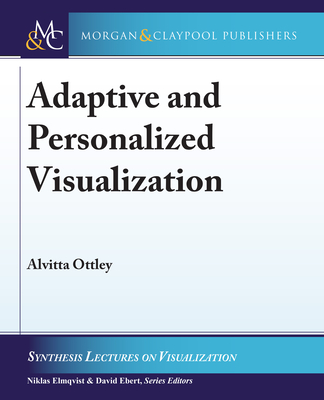Adaptive and Personalized Visualization
暫譯: 自適應與個性化視覺化
Ottley, Alvitta
- 出版商: Morgan & Claypool
- 出版日期: 2020-03-18
- 售價: $1,770
- 貴賓價: 9.5 折 $1,682
- 語言: 英文
- 頁數: 118
- 裝訂: Quality Paper - also called trade paper
- ISBN: 168173740X
- ISBN-13: 9781681737409
海外代購書籍(需單獨結帳)
商品描述
There is ample evidence in the visualization community that individual differences matter. These prior works highlight various personality traits and cognitive abilities that can modulate the use of the visualization systems and demonstrate a measurable influence on speed, accuracy, process, and attention. Perhaps the most important implication of this body of work is that we can use individual differences as a mechanism for estimating when a design is effective or to identify when people may struggle with visualization designs.
These effects can have a critical impact on consequential decision-making processes. One study that appears in this book investigated the impact of visualization on medical decision-making showed that visual aides tended to be most beneficial for people with high spatial ability, a metric that measures a person's ability to represent and manipulate two- or three-dimensional representations of objects mentally. The results showed that participants with low spatial ability had difficulty interpreting and analyzing the underlying medical data when they use visual aids. Overall, approximately 50% of the studied population were unsupported by the visualization tools when making a potentially life-critical decision. As data fluency continues to become an essential skill for our everyday lives, we must embrace the growing need to understand the factors that may render our tools ineffective and identify concrete steps for improvement.
This book presents my current understanding of how individual differences in personality interact with visualization use and draws from recent research in the Visualization, Human-Computer Interaction, and Psychology communities. We focus on the specific designs and tasks for which there is concrete evidence of performance divergence due to personality. Additionally, we highlight an exciting research agenda that is centered around creating tailored visualization systems that are aligned with people's abilities. The purpose of this book is to underscore the need to consider individual differences when designing and evaluating visualization systems and to call attention to this critical research direction.
商品描述(中文翻譯)
在視覺化社群中,有充分的證據顯示個體差異是重要的。這些先前的研究突顯了各種人格特質和認知能力,這些特質和能力可以調節視覺化系統的使用,並對速度、準確性、過程和注意力產生可測量的影響。這些研究最重要的啟示或許在於,我們可以利用個體差異作為估計設計有效性的一種機制,或識別人們在視覺化設計中可能遇到的困難。
這些影響可能對重要的決策過程產生關鍵影響。本書中出現的一項研究調查了視覺化對醫療決策的影響,顯示視覺輔助工具對於具有高空間能力的人最為有益,空間能力是一種衡量個體在心智上表示和操作二維或三維物體的能力的指標。結果顯示,具有低空間能力的參與者在使用視覺輔助工具時,對於解釋和分析潛在的醫療數據感到困難。整體而言,約有50%的研究對象在做出潛在的生命關鍵決策時未能得到視覺化工具的支持。隨著數據流暢性逐漸成為我們日常生活中的一項基本技能,我們必須接受理解可能使我們的工具無效的因素的日益需求,並確定具體的改進步驟。
本書呈現了我目前對人格差異如何與視覺化使用互動的理解,並借鑒了視覺化、人機互動和心理學領域的最新研究。我們專注於那些有具體證據顯示因人格而產生表現差異的特定設計和任務。此外,我們強調了一個令人興奮的研究議程,該議程圍繞著創建與人們能力相符的量身定制的視覺化系統。這本書的目的是強調在設計和評估視覺化系統時考慮個體差異的必要性,並引起對這一關鍵研究方向的關注。












